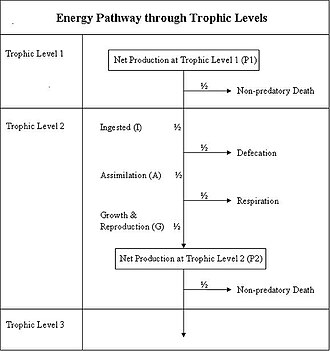Ecological efficiency
Overview of ecological efficiency in ecosystems
Ecological Efficiency[edit]

Ecological efficiency refers to the efficiency with which energy is transferred from one trophic level to the next in an ecosystem. It is a key concept in ecology that helps to understand the flow of energy through food chains and food webs.
Trophic Levels[edit]
In an ecosystem, organisms are grouped into different trophic levels based on their source of energy. The primary trophic levels include:
- Producers: These are typically plants and algae that convert solar energy into chemical energy through photosynthesis.
- Primary consumers: These are herbivores that feed on producers.
- Secondary consumers: These are carnivores that feed on primary consumers.
- Tertiary consumers: These are higher-level carnivores that feed on secondary consumers.
Energy Transfer[edit]
Energy transfer between trophic levels is not 100% efficient. Typically, only about 10% of the energy at one trophic level is transferred to the next level. This is known as the "10% rule". The rest of the energy is lost as heat, used in metabolism, or left in undigested parts.
Factors Affecting Ecological Efficiency[edit]
Several factors can influence ecological efficiency, including:
- Metabolic rate: Organisms with higher metabolic rates tend to have lower ecological efficiency.
- Diet: The type of food consumed can affect the efficiency of energy transfer.
- Environmental conditions: Temperature, availability of resources, and other environmental factors can impact efficiency.
Importance of Ecological Efficiency[edit]
Understanding ecological efficiency is crucial for several reasons:
- It helps in understanding the carrying capacity of ecosystems.
- It is essential for conservation biology and managing biodiversity.
- It provides insights into the sustainability of food production systems.
Related Pages[edit]
Ad. Transform your life with W8MD's Budget GLP-1 injections from $75


W8MD offers a medical weight loss program to lose weight in Philadelphia. Our physician-supervised medical weight loss provides:
- Weight loss injections in NYC (generic and brand names):
- Zepbound / Mounjaro, Wegovy / Ozempic, Saxenda
- Most insurances accepted or discounted self-pay rates. We will obtain insurance prior authorizations if needed.
- Generic GLP1 weight loss injections from $75 for the starting dose.
- Also offer prescription weight loss medications including Phentermine, Qsymia, Diethylpropion, Contrave etc.
NYC weight loss doctor appointmentsNYC weight loss doctor appointments
Start your NYC weight loss journey today at our NYC medical weight loss and Philadelphia medical weight loss clinics.
- Call 718-946-5500 to lose weight in NYC or for medical weight loss in Philadelphia 215-676-2334.
- Tags:NYC medical weight loss, Philadelphia lose weight Zepbound NYC, Budget GLP1 weight loss injections, Wegovy Philadelphia, Wegovy NYC, Philadelphia medical weight loss, Brookly weight loss and Wegovy NYC
|
WikiMD's Wellness Encyclopedia |
| Let Food Be Thy Medicine Medicine Thy Food - Hippocrates |
Medical Disclaimer: WikiMD is not a substitute for professional medical advice. The information on WikiMD is provided as an information resource only, may be incorrect, outdated or misleading, and is not to be used or relied on for any diagnostic or treatment purposes. Please consult your health care provider before making any healthcare decisions or for guidance about a specific medical condition. WikiMD expressly disclaims responsibility, and shall have no liability, for any damages, loss, injury, or liability whatsoever suffered as a result of your reliance on the information contained in this site. By visiting this site you agree to the foregoing terms and conditions, which may from time to time be changed or supplemented by WikiMD. If you do not agree to the foregoing terms and conditions, you should not enter or use this site. See full disclaimer.
Credits:Most images are courtesy of Wikimedia commons, and templates, categories Wikipedia, licensed under CC BY SA or similar.
Translate this page: - East Asian
中文,
日本,
한국어,
South Asian
हिन्दी,
தமிழ்,
తెలుగు,
Urdu,
ಕನ್ನಡ,
Southeast Asian
Indonesian,
Vietnamese,
Thai,
မြန်မာဘာသာ,
বাংলা
European
español,
Deutsch,
français,
Greek,
português do Brasil,
polski,
română,
русский,
Nederlands,
norsk,
svenska,
suomi,
Italian
Middle Eastern & African
عربى,
Turkish,
Persian,
Hebrew,
Afrikaans,
isiZulu,
Kiswahili,
Other
Bulgarian,
Hungarian,
Czech,
Swedish,
മലയാളം,
मराठी,
ਪੰਜਾਬੀ,
ગુજરાતી,
Portuguese,
Ukrainian